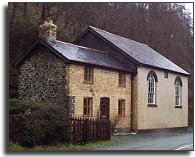
The Anglican
and the Non-Conformist
churches had an effect on many aspects of life in Wales in the 19th Century.
For example, at the beginning of Queen Victoria’s reign, two societies
existed to run schools for people who could not afford to pay for their
children to be educated.
One was called the National Society,
and it aimed to teach the Anglican religion to the poor. The other was
called the British and Foreign Society,
and it promoted education that was not centred on religion.
Nonconformist - outside the Church of England
The report itself was very unpopular because it included remarks that were offensive to Welsh people. Some Anglican clergy blamed a chapel upbringing for Non-Conformist children doing badly at school, and this too caused resentment.
